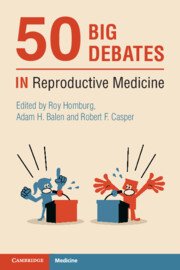Book contents
- 50 Big Debates in Reproductive Medicine
- Series page
- 50 Big Debates in Reproductive Medicine
- Copyright page
- Contents
- Contributors
- Foreword
- Introduction
- Section I Limits for IVF
- Section II IVF Add-ons
- Section III The Best Policy
- Section IV Embryology
- Section V Ethics and Statistics
- Section VI Male-factor Infertility
- Section VII Genetics
- 38A Genome Editing Should Be Allowed for the Prevention of Life-Threatening Genetic Diseases
- 38B Genome Editing Should Be Allowed for the Prevention of Life-Threatening Genetic Diseases
- 39A PGT-A Should Be Offered for Recurrent Implantation Failure
- 39B PGT-A Should Be Offered for Recurrent Implantation Failure
- 40A PGT-A Should Be Offered for All Women
- 40B PGT-A Should Be Offered for All Women
- Section VIII Ovarian Stimulation
- Section IX Hormones and the Environment
- Index
- References
39B - PGT-A Should Be Offered for Recurrent Implantation Failure
Against
from Section VII - Genetics
Published online by Cambridge University Press: 25 November 2021
- 50 Big Debates in Reproductive Medicine
- Series page
- 50 Big Debates in Reproductive Medicine
- Copyright page
- Contents
- Contributors
- Foreword
- Introduction
- Section I Limits for IVF
- Section II IVF Add-ons
- Section III The Best Policy
- Section IV Embryology
- Section V Ethics and Statistics
- Section VI Male-factor Infertility
- Section VII Genetics
- 38A Genome Editing Should Be Allowed for the Prevention of Life-Threatening Genetic Diseases
- 38B Genome Editing Should Be Allowed for the Prevention of Life-Threatening Genetic Diseases
- 39A PGT-A Should Be Offered for Recurrent Implantation Failure
- 39B PGT-A Should Be Offered for Recurrent Implantation Failure
- 40A PGT-A Should Be Offered for All Women
- 40B PGT-A Should Be Offered for All Women
- Section VIII Ovarian Stimulation
- Section IX Hormones and the Environment
- Index
- References
Summary
Pre-implantation genetic testing for aneuploidies (PGT-A) has been described as the solution for embryo selection for use universally and in select patient cohorts, including those with recurrent implantation failure (RIF) and recurrent miscarriages. However, there is considerable doubt about the accuracy of the test itself; even when using the most up-to-date technique of next generation DNA sequencing on a blastocyst biopsy, there is a risk of generating a false-positive result, and subsequently discarding healthy embryos. Indeed, there are reports of multiple cases of healthy euploid children born following the transfer of an alleged aneuploid embryo. Furthermore, mosaic embryos generate difficult challenges, and when transferred may also result in a healthy child; but are often discarded. Multiple large randomised controlled studies have failed to demonstrate a statistically significant improvement in live birth following PGT-A, and given the additional stress fragile embryos must endure during the process of biopsying, there is no conceivable value in the use of PGT-A either for use universally or in RIF patients.
- Type
- Chapter
- Information
- 50 Big Debates in Reproductive Medicine , pp. 202 - 204Publisher: Cambridge University PressPrint publication year: 2021

